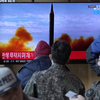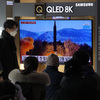[ad_1]

People watch a TV showing a file image of North Korea’s missile launch during a news program at the Seoul Railway Station in Seoul, South Korea, on Saturday, March 5, 2022. North Korea on Saturday fired a suspected ballistic missile into the sea, apparently extending its streak of weapons tests this year amid a prolonged freeze in nuclear negotiations with the United States.
Ahn Young-joon/AP
hide caption
toggle caption
Ahn Young-joon/AP

People watch a TV showing a file image of North Korea’s missile launch during a news program at the Seoul Railway Station in Seoul, South Korea, on Saturday, March 5, 2022. North Korea on Saturday fired a suspected ballistic missile into the sea, apparently extending its streak of weapons tests this year amid a prolonged freeze in nuclear negotiations with the United States.
Ahn Young-joon/AP
SEOUL, South Korea — North Korea on Saturday fired a suspected ballistic missile into the sea, according to its neighbors’ militaries, apparently extending its streak of weapons tests this year amid a prolonged freeze in nuclear negotiations with the United States.
South Korea’s Joint Chiefs of Staff said it detected a single launch of a presumed ballistic missile from an area near the North Korean capital of Pyongyang toward the country’s eastern waters, but it didn’t immediately say how far the weapon flew. Japan’s Defense Ministry also assessed the weapon as possibly ballistic.
Japan’s Coast Guard issued a warning to vessels that an object it described as a potential ballistic missile possibly landed in waters between the Korean Peninsula and Japan, but there were no immediate reports of damages.
South Korea’s presidential office said national security adviser Suh Hoon will preside over an emergency National Security Council meeting to discuss the launch. There was no immediate comment about the launch by the U.S. government or military.
It was North Korea’s ninth round of weapons launches in 2022 as it continues to use a pause in diplomacy to expand its military capabilities while attempting to pressure the Biden administration for concessions.
The launch came as South Koreans waited in long lines at polling stations Saturday morning to participate in early voting ahead of a presidential election next Wednesday. The voting follows months of bitter campaigning in which the two major candidates have clashed over whether South Korea should continue to pursue engagement with the belligerent North or take a harder line to check its nuclear threat.
The latest launch came about a week after South Korea and Japan said they detected the North firing a ballistic missile on Sunday that flew about 300 kilometers (190 miles) at a maximum altitude of about 600 kilometers (370 miles). The North later said that launch was designed to test a camera system it plans to install on a spy satellite that is under development.
The North’s other tests this year included a purported hypersonic missile and its first launch since 2017 of an intermediate range missile potentially capable of reaching Guam, a major U.S. military hub in the Pacific.
Analysts say North Korea could up the ante in coming months and possibly resume its testing of major weapons like intercontinental ballistic missiles as it tries to move the needle with Washington, which is now preoccupied with Russia’s invasion of Ukraine and regional competition with China.
During a ruling Workers Party conference called by North Korean leader Kim Jong Un last month, Politburo members issued a veiled threat to resume the tests of nuclear devices and ICBMs, which Kim had unilaterally suspended in 2018 to make room for diplomacy with then-President Donald Trump.
But negotiations remain derailed after the collapse of Trump and Kim’s second meeting in February 2019, when the Americans rejected North Korea’s demands for major sanctions relief in exchange for dismantling an aging nuclear facility, which would have amounted to a partial surrender of its nuclear capabilities.
The Biden administration has offered open-ended talks with Pyongyang but shown no willingness to offer badly needed economic benefits unless the North takes real steps to cut down its nuclear weapons and missile program.
[ad_2]
Source link



Comments are closed.